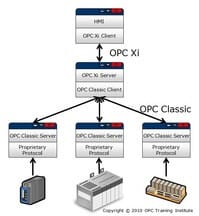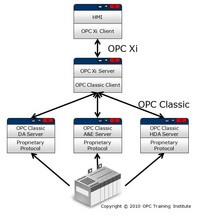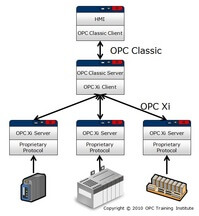Update 2: OPC Xi is now called OPC .NET 3.0.
Update and bump: I want to thank Randy Kondor for giving me permission to add the architecture pictures to the post below!
Original post: Reading through my RSS feeds this morning, I came across this post, OPC UA and Xi for users and developers, by OPC Foundation president Tom Burke. The post pointed to some recorded webinars for OPC UA [Unified Architecture] and OPC Express Interface (Xi).
I’ve described the advancement of the OPC Xi standard in several blog posts, so I had a keen interest in the OPC Xi webinar. There are three recorded webinars available:
- Webinar 1: Migration from Classic OPC to OPC Xi
- Webinar 2: Hands-On: Migration to OPC Xi with Converters
- Webinar 3: Migration to OPC Xi for Software Developers
You must register in order to view these tutorials. I took the plunge and registered so I could watch the first one. It is primarily geared for automation professionals instead of IT professionals. The total run time is 30 minutes, but it is the first 19 minutes that is valuable for plant engineers. The narrator, OPC Training Institute‘s Randy Kondor, very clearly explains what OPC Xi is, how it helps integrate plant communications, and how it interoperates with existing OPC classic communications such as OPC Data Access (DA), OPC Alarms & Events (A&E), and OPC Historical Data Access (HDA).
The video presentation describes two fundamental changes between OPC Xi and the OPC classic communications standards. The first is the change from using Microsoft’s DCOM as the communications and security transport to Microsoft’s Windows Communications Foundation (WCF), part of their family of the .NET Framework. What all this jargon means for automation engineers is that the communications is built on the authentication, authorization, encryption, and other security measures required for robust, secure communications. DCOM was never designed for the complexities of networks with firewalls, DMZs, and other methods of network security.
The other fundamental change was to borrow an OPC UA concept to add an information model specification layer on top of the DA, A&E, and HDA servers. This provides a way for logical objects, such as pumps or valves, based on some of the existing IEC, ISA, OAGi, and other information model standards.
 At 12:35 in the webinar, Randy shows various architectures that connect classic OPC servers and clients with OPC Xi servers and clients. A converter or driver wraps a classic OPC server and provides its data to OPC Xi clients. Likewise, a classic OPC client has a converter to connect to OPC Xi servers. The architecture pictures really show the interoperability and backward compatibility between OPC classic and OPC Xi.
At 12:35 in the webinar, Randy shows various architectures that connect classic OPC servers and clients with OPC Xi servers and clients. A converter or driver wraps a classic OPC server and provides its data to OPC Xi clients. Likewise, a classic OPC client has a converter to connect to OPC Xi servers. The architecture pictures really show the interoperability and backward compatibility between OPC classic and OPC Xi. I’ve asked if I can embed some of the pictures from the video and will update the post if I get the OK from Randy.
 At 15:25, he shows how OPC Xi can consolidate separate OPC DA, OPC A&E, and OPC HDA servers into a single OPC Xi server. It can also consolidate OPC servers from different suppliers into one common OPC Xi server. Also the reverse is shown where multiple OPC Xi servers can be connected to one common classic OPC server, again to support full backward compatibility.
At 15:25, he shows how OPC Xi can consolidate separate OPC DA, OPC A&E, and OPC HDA servers into a single OPC Xi server. It can also consolidate OPC servers from different suppliers into one common OPC Xi server. Also the reverse is shown where multiple OPC Xi servers can be connected to one common classic OPC server, again to support full backward compatibility.
 Just past the 19 minute mark the presentation shifts to OPC Xi Developer Toolkits and may be of interest to your IT community. At 24:45, the video highlights the growing list of suppliers who are involved with an OPC Xi interoperability demonstration.
Just past the 19 minute mark the presentation shifts to OPC Xi Developer Toolkits and may be of interest to your IT community. At 24:45, the video highlights the growing list of suppliers who are involved with an OPC Xi interoperability demonstration.
A section on the OPC Foundation website has more on the OPC Express Interface (Xi) communications standard.
